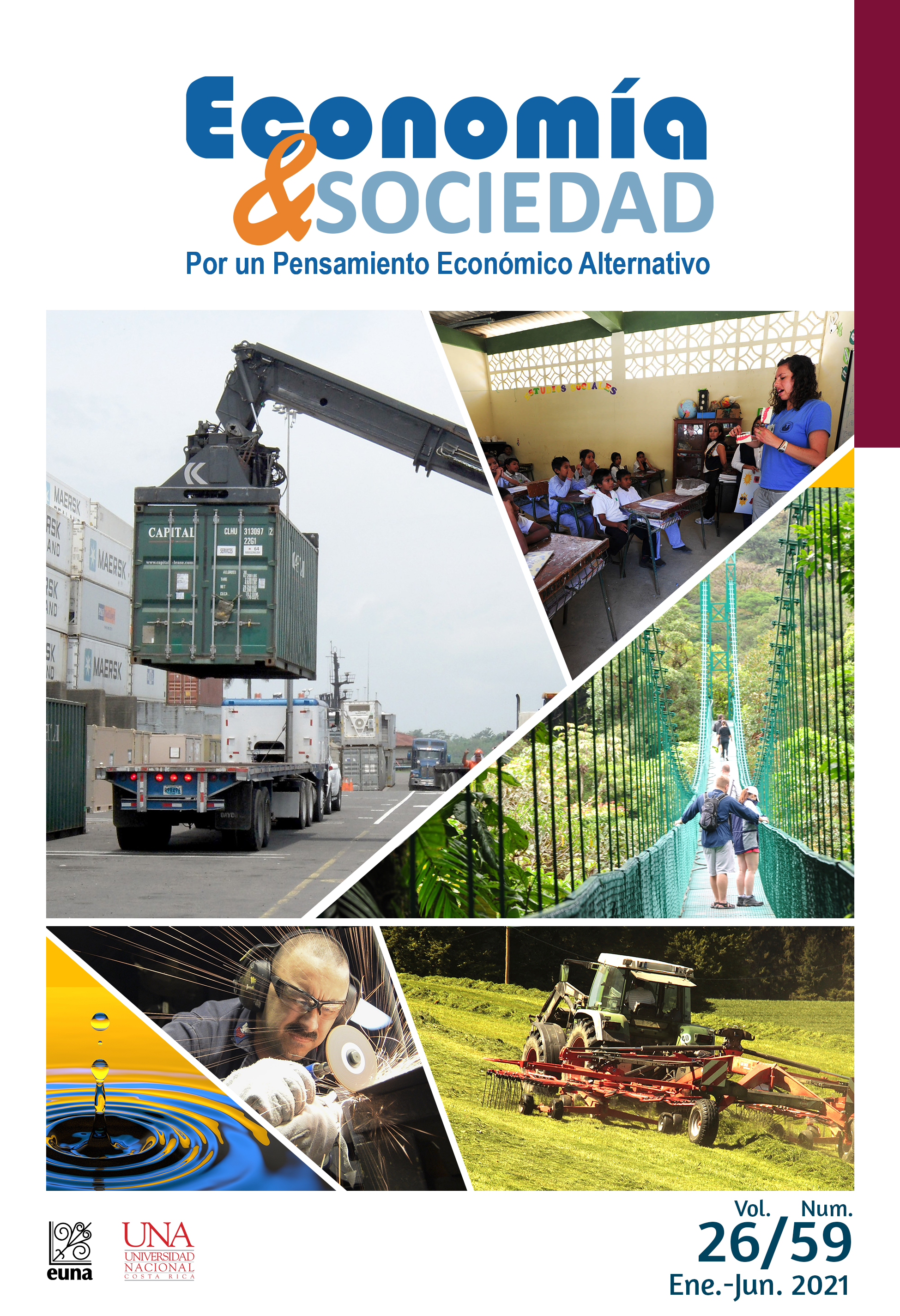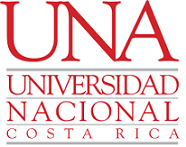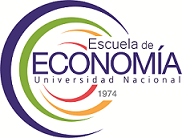Historic-Epistemological evolution of the Circular Economy: ¿Towards a new development paradigm?
DOI:
https://doi.org/10.15359/eys.26-59.5Keywords:
economic systems, environment, circularity, wasteAbstract
The historic-epistemological development of the Circular Economy concept has been a process which started with the classical school of economics since the end of the XVIII century, and which was consolidated until the first two decades of the XXI century. From its beginnings, classical economists showed notion of the possible consequences of reaching the planet resources’ limit and reaching a stationary state, even generating concerns due to the negative impact of the mainstream economic market model in the environment. Such concern deepened during the XX century when a new counterculture environmental movement was born, which brought innovative ideas to regenerate and restore our resources, based on how the natural systems work. Therefore, Circular Economy arises as a robust concept in the XXI century that is considered a new development paradigm that requires prompt action schemes to change the direction in the use of the finite resources of our planet.
References
Benyus, J. (s.f.). Biomimicry: innovation inspired by nature. Nueva York, Estados Unidos, HarperCollins e-books. Recuperado en Diciembre de 2020 en: https://www.amazon.com/
Boulding, K. (2012). La economía de la futura nave espacial Tierra. Revista de Economía Crítica, 14, 327-338. (Obra original publicada en 1966)
Carson, R. (2010). Primavera silenciosa. Barcelona, España: Crítica. (Obra original publicada en 1962)
Commoner, B. (1963), Ciencia y Supervivencia, Nueva York, Estados Unidos: Viking Press.
Comisión Mundial de Medio Ambiente y Desarrollo (CMMAD) (1987), Informe de la Comisión Mundial de Medio Ambiente y Desarrollo: Nuestro futuro común, Documento de Asamblea General de Naciones Unidas A/42/47. Recuperado en Diciembr 2020 de: http://www.ecominga.uqam.ca/PDF/BIBLIOGRAPHIE/GUIDE_LECTURE_1/CMMAD-Informe-Comision-Brundtland-sobre-Medio-Ambiente-Desarrollo.pdf.
Crocker, R., Saint, C., Chen, G. & Yindong, T. (Eds). (2018). Unmaking waste in production and consumption: towards the circular economy (pp. 13-33). Bingley, Reino Unido: Emerald Publishing Limited.
Grupo Banco Mundial (2020). Estimados de Población y Proyecciones, Indicadores del Desarrollo Mundial [Fichero de datos]. Recuperado en Diciembre 2020 en: https://databank.bancomundial.org/reports.aspx?source=world-development-indicators.
Ellen Macarthur Foundation (2013). Towards the circular economy: Economic and business rationale for an accelerated transition, v. 1. Recuperado en Diciembre 2020 de: http://www.ellenmacarthurfoundation.org/business/reports
Ellen Macarthur Foundation (Diciembre 02, 2015). Towards a Circular Economy: Business Rationale for an accelerated transition. Recuperado en Diciembre 2020 de: http://www.ellenmacarthurfoundation.org/business/reports
Ellen Macarthur Foundation (Enero 24, 2019). Cities and Circular Economy for Food. Recuperado en Diciembre 2020 de: http://www.ellenmacarthurfoundation.org/business/reports
Ellen Macarthur Foundation (Enero 23, 2019). Artificial Intelligence and the Circular Economy. Recuperado en Diciembre 2020 de: http://www.ellenmacarthurfoundation.org/business/reports
Ellen Macarthur Foundation (Marzo 4, 2019). Circular Economy in Cities. Recuperado en Diciembre 2020 de: http://www.ellenmacarthurfoundation.org/business/reports
Ehrlich, P. (1968). The population bomb. Nueva York, Estados Unidos: Ballantine Books.
Formia, E. (2017). Mediating an ecological awareness in Italy: Shared visions of sustainability between the environmental movement and radical design cultures (1970– 1976). Journal of Design History, 30(2), 192–211.
Geissdoerfer, M. et al. (2017). The Circular Economy: A new sustainability paradigm? Journal of Cleaner Production, 143, 757-768.
Graedel, T., Allenby, B. (1995). Industrial Ecology. New Jersey, Estados Unidos, Prentice Hall.
Hotelling, H. (1931). The economics of exhaustible resources, Journal of Political Economy, 39(2), 137-175.
Jevons, J. S. (2018). The coal question: an inquiry concerning the progress of the nation, and the probable exhaustion of our coal mines, Londres, Inglaterra: Franklin Classics. Recuperado en Diciembre 2020 de: https://www.amazon.com/ (Obra original publicada en 1865)
Lyle, J. T. (1994). Regenerative design for sustainable development. Nueva York, Estados Unidos: Wiley. Recuperado en Diciembre 2020 de: https://www.amazon.com/
Malthus, T. (1846). Ensayo sobre el principio de la población (Trad. J.M. Noguera y Joaquín Miguel). Establecimiento Literario y Litográfico de D. Lucas González y Co. Madrid, España. Recuperado en Diciembre 2020 en: https://archive.org/details/A061288040 (Obra original publicada en 1798).
Marx, K. (1999). Capital: a critique of Political Economy, Vol. III, New York, Estados Unidos: International Publishers. Recuperado en Junio 2021 de: https://www.marxists.org/archive/marx/works/download/pdf/Capital-Volume-III.pdf. (Obra original publicada en 1894).
Meadows, D., Meadows, D., Randers, J. y Behrens, W. (1972). Los límites del crecimiento. Informe al Club de Roma sobre el Predicamento de la Humanidad. Ciudad de México, México: Fondo de Cultura Económica.
McDonough, W., & Braungart, M. (2002). Cradle to cradle: Remaking the way we make things. Nueva York, Estados Unidos: North Point Press. Recuperado en Diciembre 2020 de: https://www.amazon.com/
McHarg, I. L. (1969). Design with nature. Nueva York, Estados Unidos: Natural History Press.
Mill, J. S. (1978). Principios de Economía Política. Ciudad de México, México: Fondo de Cultura Económica. Ciudad de México, México. (Obra original publicada en 1848).
Organization of Economic Development and Cooperation. (2018). Global Material Resources Outlook to 2060: Economic drivers and environmental consequences. OECD Publishing, Paris. Recuperado en Diciembre 2020 de: http://www.oecd.org/environment/global-material-resources-outlook-to-2060-9789264307452-en.htm
Pauli, G. (2010). The Blue Economy. New Mexico, Estados Unidos: Paradigm Publications.
Pearce, D., Turner, R. (1990). Economics of Natural Resources and the Environment. Maryland, Estados Unidos: John Hopkins University Press.
Pigou, A. C. (2010). The Economics of Welfare. Indianapolis, Estados Unidos: Liberty Fund, Inc. Recuperado en Junio 2021 de: https://edisciplinas.usp.br/pluginfile.php/4154221/mod_resource/content/0/Pigou-The_Economic_of_Welfare_1920.pdf (Obra original publicada en 1932, cuarta edición)
Polimeni, J. et al. (2009). The Jevons Paradox and the Myth of Resource Efficiency Improvements, Sustainability: Science, Practice and Policy, 15(1), 48-54.
Ricardo, D. (2004). On the Principles of Political Economy and Taxation (Edited by Pierro Sraffa). Editorial Liberty Fund. Recuperado en Junio 2021 de: https://www.econlib.org/library/Ricardo/ricP.html?chapter_num=6#book-reader (Obra original publicada en 1821)
Riechmann, T. (2010). Entropía, recursos naturales y economía ecológica. Revista Daphnia, 53, Recuperado en Junio 2021 de: http://www.daphnia.es/revista/53/articulo/1028/Entropia-recursos-naturales-y-economia-ecologica
Roszak, T. (1969). The Making of the Counter Culture: Reflections on the technocratic society and its youthful opposition. California, Estados Unidos: University of California Press.
Romer, P. (1990). Endogenous Technological Change. Journal of Political Economy, 98(5), 71–102.
Smith, A. (s.f.). La riqueza de las naciones. Panamas classics. Recuperado en Diciembre 2020 de: https://www.amazon.com/ (Obra original en 1776)
Stahel, W. (1982). The product life factor. En: Orr, G.S. (Ed.), An Inquiry into the Nature of Sustainable Societies. The Role of the Private Sector (pp. 72-105).
Texas, Estados Unidos: Houston Area Research Center, Houston, Texas, Estados Unidos de America. Recuperado en Diciembre 2020 de: https://p2infohouse.org/ref/33/32217.pdf
Stahel, W., Reday, G., (1976). The Potential for Substituting Manpower for Energy. Report to the Commission of the European Communities.
Stahel, W., (2006). The Performance Economy. Hampshire, Inglaterra: Palgrave Macmillan.
Turner, F. (2006). From counterculture to cyberculture: Stewart Brand, the whole earth network and the rise of digital utopianism. Illinois, Estados Unidos: Chicago University Press.
Published
How to Cite
Issue
Section
License
This publication is subject to the Creative Commons License; therefore, its attributions and restrictions must be respected.
Authors publishing in this Journal accept the following conditions:
- Authors retain copyright ownership and give the Journal first publication right of the paper, which is registered with the Creative Commons Attribution-NonCommercial-ShareAlike 4.0 International License. This license allows third parties to use the published work provided it is sourced as firstly published in this Journal.
- Authors may enter into other independent and additional contractual agreements for the non-exclusive distribution of the article published in this Journal (e.g., to be included in an institutional repository or published in a book) provided it is clearly stated that the work was published in this Journal for the first time.
- Authors are allowed and recommended to publish their work on the Internet (for example, on institutional or personal pages) before and during the review and publication process, as it can lead to productive exchanges and a greater and faster dissemination of work published.

The Economía & Sociedad Journal, published by Universidad Nacional, is licensed under a Creative Commons Reconocimiento-NoComercial-CompartirIgual 4.0 Internacional License. Based on http://www.revistas.una.ac.cr/index.php/economia.








